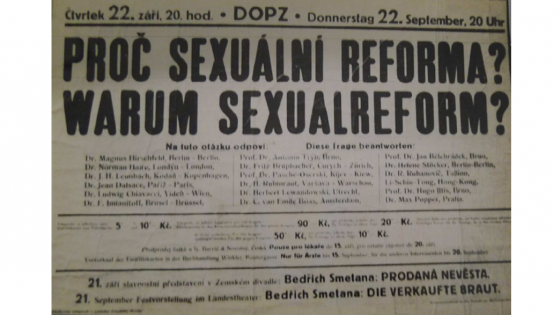Sexual Knowledge and Expertise in Europe’s East, before and after 1945

The history of sexology has recently shown considerable interest in exploring the global dimensions of the emergence of sexual science. Important work has begun to chart the worldwide transnational networks of exchange and expertise, and examine how sexual science assumed different shapes in various locales. Such scholarship has explored the translation, interpretation and circulation of sexual knowledge across linguistic, cultural and national boundaries. It has begun to recognize that sexual scientific knowledge was constituted by and then transformed through dynamic, multi-directional and truly global interactions. East-Central Europe played a key role in shaping the development of sexual science from the 1880s onwards, yet relatively little attention has been paid to the history of sexual science in nonGerman speaking East-Central Europe and its significance in global networks of knowledge production. One goal of this conference is to bring the history of sexual science in East-Central Europe into the global history of sexology.
The aim of this conference is to enhance our current understandings of the transnational histories of sexual science in its broadest sense, from psychoanalytic and medical debates about and approaches to gender and sexuality, to conversations about sex and sexuality in literature, theatre and art, to the impacts of scientific notions of sex on politics. The conference therefore invites participants from various disciplines and fields to ask:
- How was East-Central European sexology involved in global networks of knowledge exchange?
- How did definitions of the boundaries and contours of sexual science (e.g. as a field or discipline) shift across national and linguistic contexts?
- How did East-Central European sexual science view and perceive sexual scientific debates within the region, in other parts of the world and how was the Eastern science perceived elsewhere?
Moreover, this conference invites delegates to explore the role varying definitions of authority and expertise played in the construction of sexual knowledge:
- Did understandings of authority and expertise differ in significant ways across national, linguistic and cultural contexts?
- What strategies did East-Central European sexual scientists use to position themselves as experts on a local and global level?
- What role did patients in East-Central Europe play in the construction of sexual knowledge?
- What are the links between scientific engagements with sex and sexuality and both literary and artistic cultures and politics discourses? In the East-Central European context, how did literary, artistic, or ideological imaginings of sexuality intersect with scientific debates?
Finally, this conference puts the particular changing cultures of knowledge production in Eastern Europe before and after 1945 under investigation. It asks:
- What kind of changes did cultures and networks of sexual-knowledge exchange undergo throughout the second half of the 20th century?
- What status did sex research have in socialist East-Central Europe and how did this differ from the cultures of the first half of the twentieth century?
- To what extent did sexual debates shift when socialism 'went global'?
- How can we explore the complex relationship between ideas of Communist/Marxist liberation of the people and the rhetoric of sexual liberation? Were socialist and sexual revolutions compatible? What is the relationship between the use of the language of equality and happiness in debates about sex and moments of political dissent and reform, e.g. in 1968?
- In what ways has sexual science interacted with, contributed to or undermined different narratives of modernity? Can this framework help us understand the importance of sexology in East-Central Europe as a vehicle of modernization?
The workshop will take place on 3-5 June, 2019 at the Faculty of Social Studies, Masaryk University in Brno, Czech Republic. Papers will be delivered in 20 minute slots. We will ask that you submit a summary of your paper for pre-circulation to all delegates.
Important dates:
January 30th 2019: deadline for 300-500 word abstract together with a 1-page CV detailing your research interests to sexualknowledgeBrno@gmail.com
February 2019: notification of acceptance for the workshop
May 1, 2019: deadline for a summary of your paper (no more than 3000 words) to sexualknowledgeBrno@gmail.com
This workshop is collaboratively organized by Bryn Mawr College, Central European University, Masaryk University, University of Exeter and University of Warsaw.


